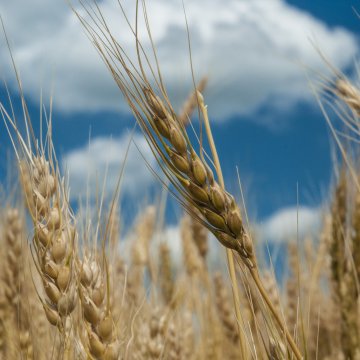Bellwether (noun) definition: something that leads or indicates a trend. Example: “The wheat market...
Wheat Prices Increase at Record Pace

The May Chicago wheat futures contract recently closed 41% higher than the prior week, a record-breaking weekly gain that reflects global fears about wheat supplies and exports amid Ukraine and Russia's war.
The May Kansas City hard red winter wheat contract finished the week 36% higher, closing at $12.14 1/2.
The impact rippled across the Plains this week as many grain elevators stopped issuing bids or accepting offers from farmers to sell wheat.
"Prices are getting so high they just aren't serving the physical markets," DTN Lead Analyst Todd Hultman said. Until there's some resolution to or at least a better understanding of the situation in Ukraine, there's little that could change the market's direction. "Fear has gripped the market in a big way."
Last week's Commodity Futures Trading Commission -Commitments of Traders report showed speculators held more than 100,000 short positions, which means they need to buy a contract to close that position. With wheat futures locking at limit up or trading near limit up each day, there have been few opportunities for those traders to cut their losses.
"That's a huge painful amount. Every dollar that market goes up, they're losing over $500 million dollars in total. That portion of the market is what's getting squeezed," Hultman said. “Traditional explanations of economics assume that there are two parties involved in markets. Buyers and sellers or producers and consumers interact to arrive at an equilibrium price.”
"Markets don't always abide by textbook behavior, like when fear becomes so great it scares one side out of the market, and in this case, it's scaring everybody that's on the short side of the market," said Hultman. "It's like playing a football game where one team doesn't show up. The other team just runs up the score. That's what's happened here. In my book, that's the definition of a broken market."
Editor’s Take:
Not surprising when nearly one-third of the world’s wheat exports are in jeopardy due to the Russian invasion of Ukraine. We quickly transformed from abundant wheat supplies to fear of severe shortages. The demand for humanitarian aide alone will drive the markets higher not to mention all the normal day-to-day demands for wheat. But the spillover to other commodities is inevitable, thus, continuing to drive prices even higher and fueling inflations beyond what we are experiencing now. That is certain to impact families, especially low to lower middle-class who are already feeling the strain on their finances.







.jpg?height=200&name=John%20Deere%20harvest%20scene%202_0%20(2).jpg)
